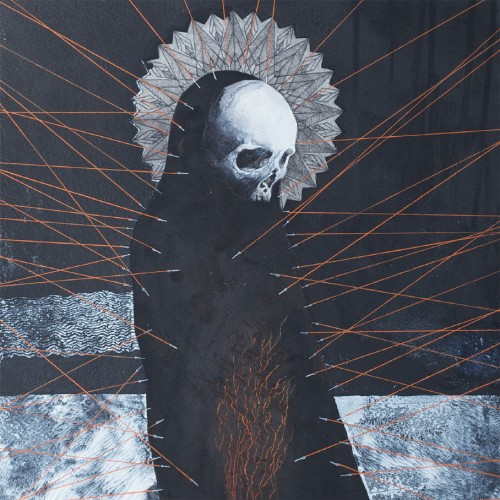There’s an unusual story behind the making of his album, one that’s both painful and inspiring. If you know the story, it can’t help but affect the way you hear the music. And that’s as it should be, because the story is at the heart of the writing and the recording of the music, too. That story has been told elsewhere, through our own interview of the music’s creator Aaron Edge, and an even more in-depth interview that appeared last week at The Obelisk. But even if you were ignorant about the album’s deeper significance, it would still hit with tremendous force.
For an album that consists of seven tracks totaling only about 25 minutes of music, there’s a temptation to say that it flies by. It does, and it doesn’t. You can read first-hand accounts of combat or other traumatic events, in which time seems to slow down. The intensity of Lumbar’s album plays a similar trick on the mind. The music itself moves in slow time, the massive distorted chords flowing like magma, groaning like titanic drawbridges being raised with rusted chains, pounding like a wrecking ball. But the slow rhythms are only part of the explanation for the music’s time-warping effect.
The sound is incredibly dense and contaminated, the guitars fuzz-bombed to the max, the music vibrating with radioactive decay, almost every second shrouded in a storm of static. The black, hallucinatory aura of the music is intensified by the layering of shrill, skittering electronic noise, shimmering cymbals, and a mega-dose of reverb. The harrowing sense of things falling apart, which pervades the album, reaches its apotheosis in “Day Five”, where rhythms and even the rudiments of melody are abandoned, leaving only the sounds of distant thunder growing into a battlefield bombardment and the howling of demented voices.
Agonizing moments of bleak, penetrating melody appear here and there, but the chords are more likely to ring out like gunshots or come down like a catastrophic deluge, drowning everything in distortion after all heads have been pounded flat by sheer percussive power.
All three vocalists — Mike Scheidt (YOB, VHÖL), Tad Doyle (TAD, Brothers of the Sonic Cloth), and Edge himself — throw themselves into their performances with an emotional intensity that matches the rest of the music. Scheidt’s contributions are particularly striking, his skyward-arcing wails striking like knives hurled straight into the heart. Elsewhere you hear the sounds of chest-bursting yells, the ravings of madmen on street corners, impassioned cries of fear and pain.
The album begins with a merciless vocal sample and ends with the sounds of storm winds blowing through abandoned buildings. In between, there are few glimmers of light and not much hope, yet the album delivers the kind of riveting cathartic experience that makes it intensely memorable as well as harrowing. In fact, it’s hard to imagine that 2013 will produce anything heavier or more distinctively soul-scouring than The First and Last Days of Unwelcome. It’s a remarkable achievement that should not be missed.
********
Gear-nerd detail: Amazingly, Aaron Edge produced possibly the most corrosive guitar and bass tones you’ll hear all year without using amplifiers or any mic-ed up speaker cabs, relying instead solely on a pre-amp pedal called the Skyhammer (created by Ben Verellen of Verellen Amplifiers), the output plugged directly into an iMac and recorded using Garageband.
The First and Last Days of Unwelcome will be released November 12 by Southern Lord and can be pre-ordered as a digital download or LP here; pre-orders come with an immediate download of “Day Six”, which can be heard below. CD and tape versions of the album will be coming. Lumbar merch is available here.
UPDATE: The entire album is now available for streaming and download on Bandcamp, and can be heard below.
http://lumbarsl.bandcamp.com/album/the-first-and-last-days-of-unwelcome#
https://www.facebook.com/thelumbarendeavor



Is it me or do the last few seconds sounds like the notes Harmonica plays on his… well… harmonica… in Once Upon a Time in the West?
It most undoubtedly is. I could recognize that harmonica anywhere, Once Upon a Time in the West is quite possibly my favorite film of all time.
Good to know I wasn’t alone.
West is a great movie. Bummed that my favorite character died, though.